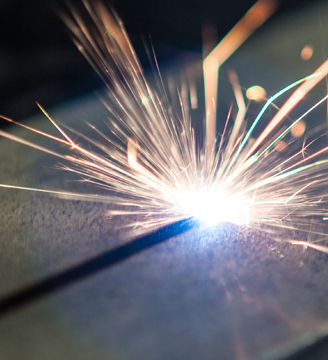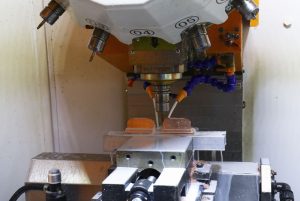(ABS is an acronym for Acrylonitrile Butadiene Styrene, which refers to Acrylonitrile Butadiene Styrene copolymer) is a thermoplastic polymeric structural material with high strength, good toughness, and easy processing and molding, also known as ABS resin.
ABS material is a graft copolymer of three monomers, acrylonitrile (Acrylonitrile), 1,3-butadiene (Butadiene), and styrene (Styrene). Its molecular formula can be written as (C8H8-C4H6-C3H3N)x, but in fact it is often a mixture of graft copolymer containing butadiene and acrylonitrile-styrene copolymer, in which acrylonitrile accounts for 15% to 35%, butadiene accounts for 5% to 30%, and styrene accounts for 40% to 60%. The most common ratio of ABS in the emulsion method is A:B:S=22:17:61, while the native The molding temperature for ABS plastics is 180-250°C, but preferably not more than 240°C, when the resin will decompose.
The physical properties of the resin change somewhat as the ratio of the three components is adjusted.
1,3-Butadiene provides ABS resin with hardness, heat resistance, and chemical resistance to acids, alkalis, and salts; styrene provides ABS resin with hardness, fluidity for processing, and product surface finish.
Properties of ABS.
ABS has an opaque appearance and ivory-colored granules, and its products can be colorful and have a high gloss. The flame is yellow, with black smoke and a special cinnamon smell.
ABS has excellent mechanical properties, its impact strength is excellent and can be used at very low temperatures: ABS has excellent wear resistance, good dimensional stability, and oil resistance, and can be used for bearings under medium load and speed. The mechanical properties of ABS are greatly affected by temperature.
The thermal deformation temperature of ABS is 93~118℃, which can be increased by about 10℃ after annealing.
4. Electrical properties: ABS has good electrical insulation and is virtually unaffected by temperature, humidity and frequency, and can be used in most environments.
ABS is not affected by water, inorganic salts, alkalis and acids, but is soluble in ketones, aldehydes and chlorinated hydrocarbons, and is subject to stress cracking by ice acetic acid and vegetable oil.
The biggest application areas of ABS resin are automotive, electronics, building materials and DIY production. In the automotive field, it is used in instrument panels, exterior panels, interior panels, steering wheels, sound insulation panels, door locks, bumpers, ventilation ducts, and many other parts. In electrical appliances, it is widely used in refrigerators, TV sets, washing machines, air conditioners, computers, copiers and other electronic appliances. For building materials, ABS pipes, ABS sanitary ware, ABS decorative panels are widely used in the building materials industry, and for DIY, model airplane wings, etc. In addition, ABS is also widely used in packaging, furniture, sports and recreational goods, machinery and instrument industry.
Shenzhen Hongfa Shunda Mould Co., Ltd. produces ABS box and waterproof box using the new environmentally friendly ABS material to produce high quality products to meet the high requirements of our customers. Not only can we change the color of ABS, but we can also do OEM opening process or screen printing according to customer’s demand.
China’s research on ABS engineering plastics began in the 1960s and has developed rapidly. According to statistics, the total consumption of plastic alloy (including modified resin) in China is about 1.2 million to 1.4 million tons, while the domestic supply is less than 600,000 tons, and the annual import is up to about 900,000 tons; and ABS engineering plastics (mainly blended resin and modified resin) in China are mainly used in home appliances, electronics, automotive and other industries, compared with developed countries, there is still a lot of expansion in the application market of plastic alloy in China Compared with developed countries, the market for plastic alloy applications in China has much room for expansion. With the continued rapid development of China’s economy, the market demand for ABS engineering plastics in China in the next few years has great potential, especially the rapid growth of electronic communications, automotive and construction industries, which will drive the rapid development of ABS engineering plastics industry in China.




